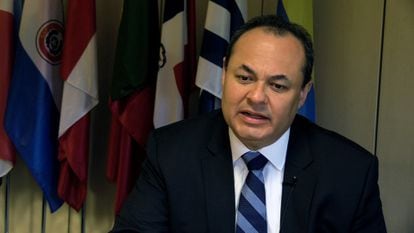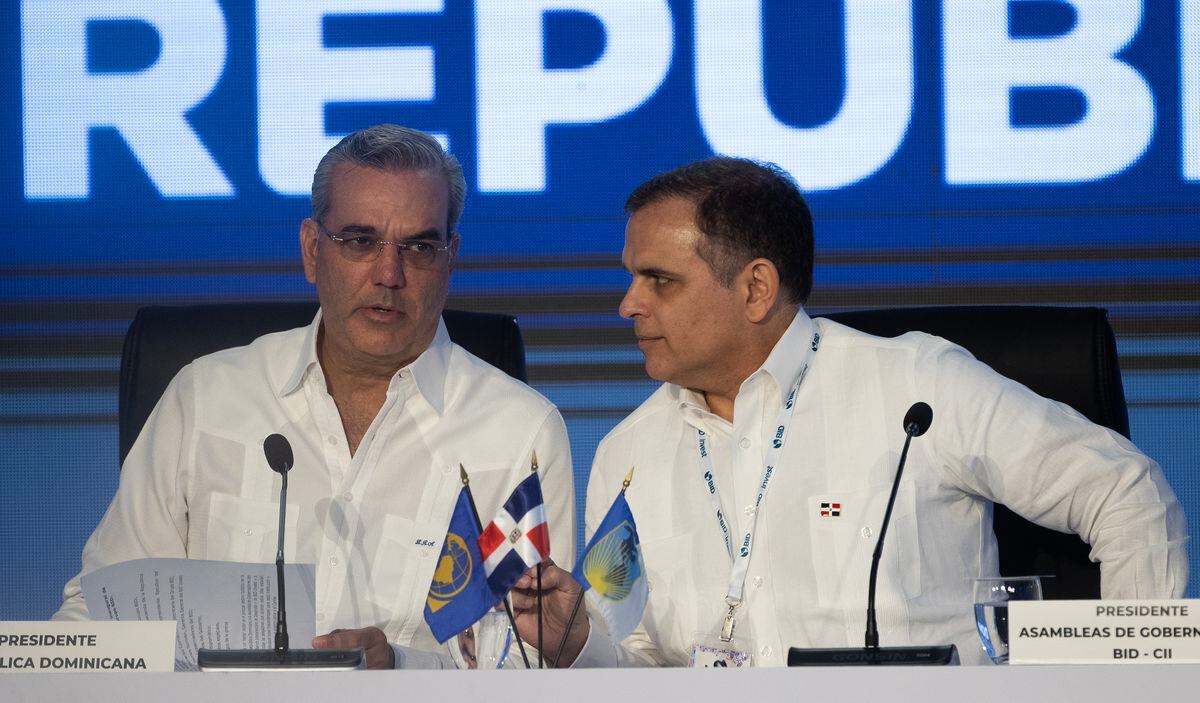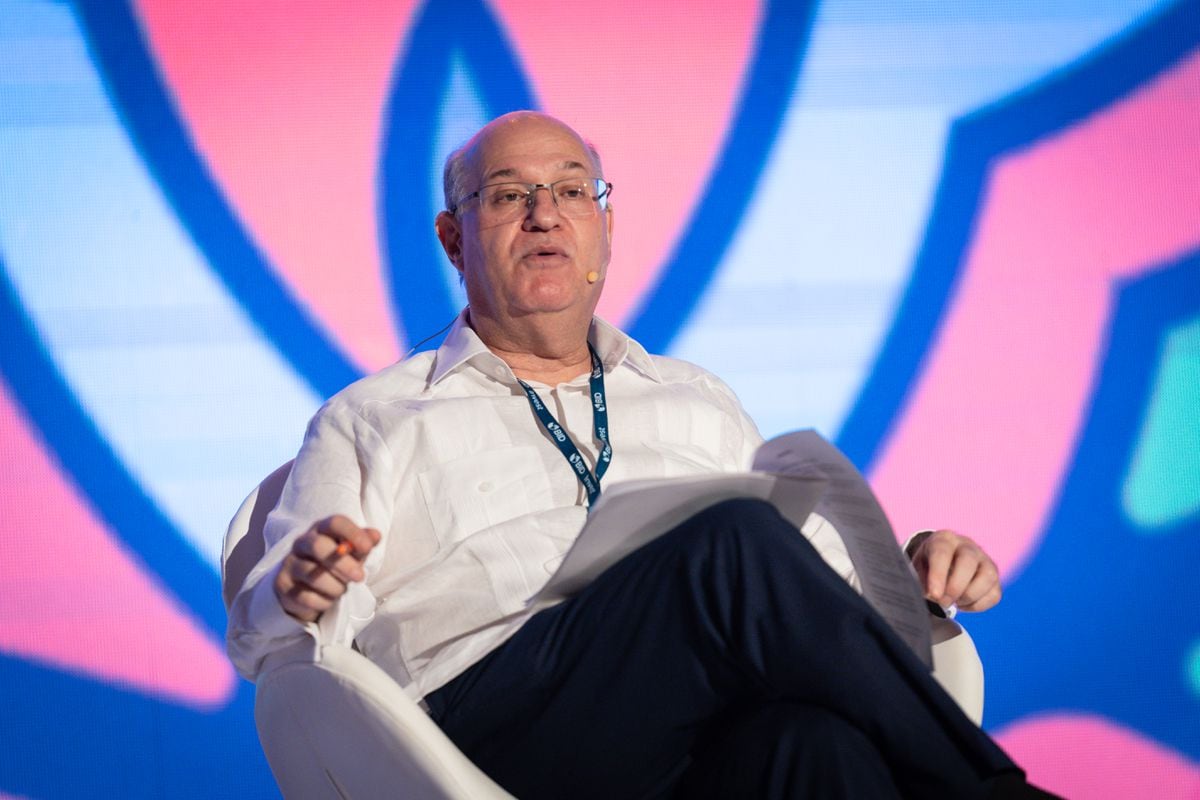The former president of CAF, Luis Carranza, in October of last year Altea Tejido / EFE
With the pandemic still shaking the main Latin American economies, the bloc's two largest development banks - the Inter-American Development Bank (IDB) and the CAF - are currently going through processes of internal upheaval that threaten to complicate their action when they need it most. the block: just as the recovery begins to appear on the horizon after months of severe recession, both organizations have entered a zone of convulsion.
The last to enter the eye of the hurricane is CAF.
The resignation of Luis Carranza as president last Tuesday, after a cascade of complaints of harassment and abuse of power, has brought the continent's second largest development bank to an
impasse
.
The Peruvian official himself will continue — uncomfortably — at the head of the institution for another month, until he is found to be relieved.
And, in that period, the body will have to go ahead with a recapitalization process that it had already partially completed and will have to look for the best moment to ask for the definitive green light from its member states.
Before, it had been the IDB's turn.
The election in September of last year of Mauricio Claver-Carone as president, with the backing of the Trump Administration, has forced the institution to operate with a heavy slab as baggage.
The imposition of the then tenant of the White House, who placed one of his faithful at the head of the institution, opened a huge gap with several countries in the region: it broke the unwritten rule that says that the position of first executive is reserved for a Latin American.
The institution was then plunged into a convulsion from which, according to several sources consulted by this newspaper, it has not yet recovered.
"At the IDB, everything is still very messy and inertia is not desirable," says a former senior official of the organization, who believes that in the short term, even with this sea in the background, the bureaucracy "ends up imposing itself" and the execution of The projects will continue without major changes.
Where things do change, and a lot, it slides under condition of anonymity, it is in a facet much less tangible but equally important: the "intellectual leadership", points in reference to the role that the bank should play beyond the purely financial.
"Advice to governments, high beams and long-term vision," he explains.
In the operation of the day, agrees Stephany Griffith-Jones, a professor at Columbia University specializing in development banking, “perhaps the instability does not have as much impact: the credit approval mechanisms are the same, for example.
But yes in the main lines: to respond to the pandemic, the IDB needs, above all, a large capital increase and the fact that the Claver-Carone does not have any sympathy with the Biden Administration, despite having been appointed by the EE. It is very worrying in the US ”.
Leadership vacuum
Latin America needs the financial muscle of its two large development banks to be able to face what is to come in the coming months: the drums of inflation in the world's leading power, still unfinished, have strained financial markets and capital invested in Emerging is always the first to jump.
"It is tragic that at a time of crisis as serious as this we face these difficulties in the two large development banks," says Christopher Sabatini, a specialist in Latin America at the
British
think tank
Chatham House.
“One is led by someone who is not of consensus and who has no experience or credibility in technical matters, and right now the second is left without a president.
It is one more reflection of the great leadership vacuum that exists in the region ”.
The double mess also hides a paradox: "Carranza's departure may reinforce Claver-Carone in the medium term," he slides.
"Why?
Because it would be very risky and damaging to further weaken the IDB and not face its recapitalization urgently ”.
"There is a total absence of truly countercyclical policies, and their internal problems are not going to help change the course," says Francisco Suárez Dávila, former Mexican Undersecretary of Finance and former Mexican representative to the Organization for Economic Cooperation and Development ( OECD).
"And the IDB, in particular, is paralyzed by internal governance problems: the only way to solve this would be to return to normality before Trump, with a Latin American as president and an American as strong vice president."
Added to the “internal instability” in these organizations, in the words of Juan Carlos Moreno Brid, professor at the National Autonomous University of Mexico (UNAM), the governments of the bloc are not taking advantage of the resources offered by these development banks.
"They are not knocking on his door, and that is a problem."
The importance of these organizations should not be underestimated in times as difficult as these, says Federico Poli, an independent consultant and, until a year ago, director of the IDB for Argentina.
"The multilateral banks have been the most effective economic integration instruments for the region," he says.
Poli recalls the electrical grid system that currently connects the six Central American countries as an example of the success that multilateral banks represent.
This network allows that if one country loses electricity generation, another country can provide it quickly.
The idea originated in 1987, but did not materialize until 2014 and was only possible thanks to the majority financing of 377.5 million dollars from the IDB, CAF and the Central American Bank for Economic Integration - the latter, of much smaller size.
"Who better than one of these multilaterals to finance a bridge, the infrastructure of a border crossing or roads that cross two countries," he says.
Political storm
Navigating in a context of permanent political storm has been an important part of the recent development of both institutions.
A thorny issue for CAF, for example, is the fact that its base is in Caracas despite the fact that the governments of the majority of the members have recognized Juan Guaidó as president of Venezuela and not Nicolás Maduro.
One of the complaints documented in letters from former employees is that Carranza changed the headquarters, unilaterally, to Peru.
"Undoubtedly, seen from the outside, it is an issue to be resolved," says Poli, "because conditions in Venezuela, a country that is experiencing a humanitarian, social and political crisis, make it difficult for any organization to function."
Venezuelan opposition leader Juan Guaidó tests positive for coronavirus
Carranza himself, who announced his resignation from CAF in a letter in which he did not address the specific complaints against his administration, lamented "the interest in politicizing the actions" of the corporation and accused members of Argentina of pressuring him to appoint a position to someone who did not meet the conditions.
Sandra Borda, professor of Political Science at the Universidad de los Andes, attributes part of the turmoil that is shaking both development banks to "the polarization that the region is going through."
“Until recently,” he reports on the other end of the phone, “in Latin America we had two types of organizations: some totally political and others technical.
But that division has disappeared, subjecting all of them to the same degrees of stress.
And when you break that balance, you lose a lot of stability ”.
In the case of the IDB and the CAF, what worries him the most is that their internal upheaval will end up giving one more opportunity for China to fill the gaps that both institutions "are not knowing how to fill", further reducing the autonomy of the region.
Lack of trust
Despite the fact that the internal upheaval in both organizations coincides in time, Paz Milet, professor at the Institute of International Studies of the University of Chile, advocates separating both cases.
“At the IDB there are still great internal differences and the profile of the new president, a person who does not come from the financial world and has no experience in this, does not help.
The question now is how Joe Biden is going to position himself ”, he points out.
Regarding the CAF, Milet is betting on a successor to Carranza with greater political weight than the Peruvian, who on his resume had only two years as his country's finance minister and several years as a banking analyst.
"Especially in a context of crisis like this, you need a figure that can overcome internal discrepancies."
"Both banks should invest in governance, because they are precisely essential elements to reduce the level of political risk, which is very high in Latin America," says Daniel Zovatto, regional director for Latin America and the Caribbean at International IDEA.
They were never so far from being able to contribute their grain of sand.
Subscribe here to the EL PAÍS América newsletter
and receive all the informational keys of the region's current affairs


/cloudfront-eu-central-1.images.arcpublishing.com/prisa/2KVLLY26ZNGK3OCBRI676KYGKA.jpg)



/cloudfront-eu-central-1.images.arcpublishing.com/prisa/RBDI3FWLIZDXBFZRE73ADUDT4M.jpg)




/cloudfront-eu-central-1.images.arcpublishing.com/prisa/DIAGMBIFCBFTJADD5SB7GXXY2A.jpg)

